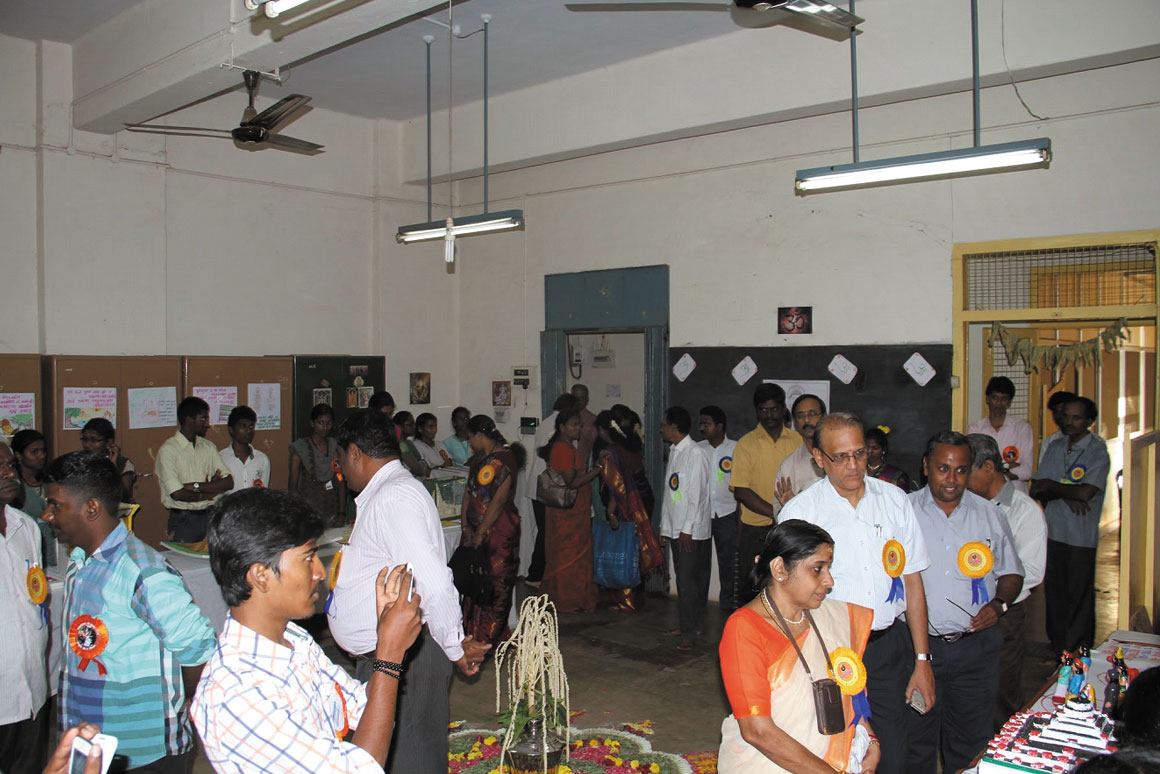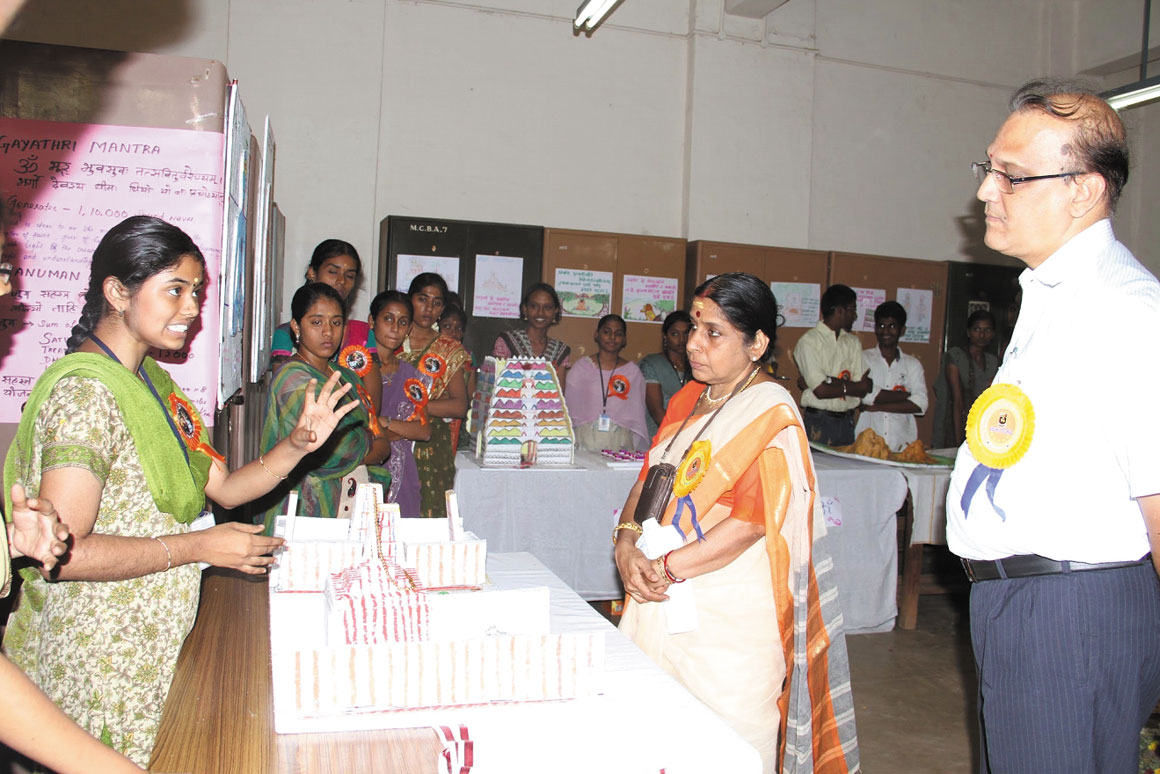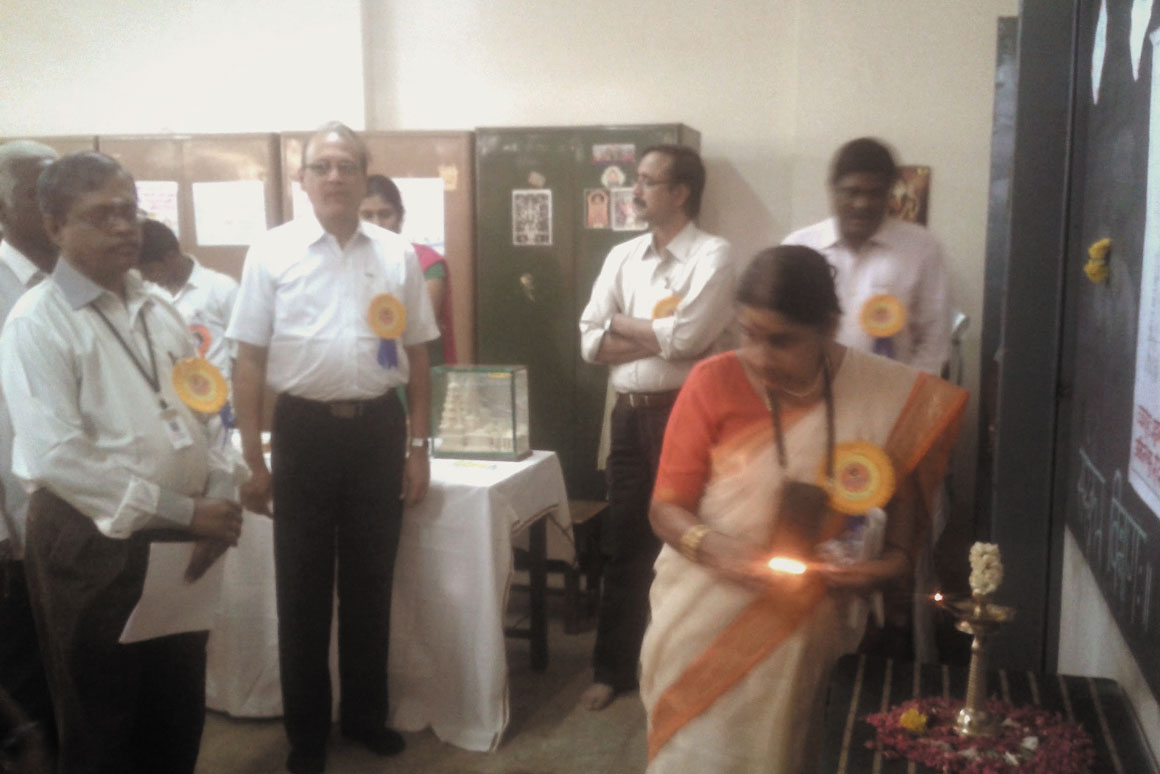Vision
To propagate Sanskrit to all students which would help them to read, write and speak in Sanskrit.
Mission
- To impart Sanskrit as Part – 1 language and Introduce Sanskrit in Google Translation.
- To introduce new courses - Comparative study of Regional literature with Sanskrit Language, Spoken Sanskrit Courses – Basic, Intermediate and Advance Levels, Sanskrit Translation course.
History / Timeline
| Year of Establishment |
1988
|
| Course Affiliation |
B.A., B.Sc., B.Com Part 1 language |
Highlights of the curriculum
- The Department offers Sanskrit as Part I language for B.Sc students for 4 semesters and for B.Com for 2 semesters.
- In the first semester fundamental Sanskrit grammar is taught and students are trained to write letters and essays etc., in Sanskrit itself.
- Sanskrit poetry, drama of ancient and modern world form the syllabus taught for students.
- The Department makes use of the Language Laboratory to promote spoken Sanskrit.
- Under the “UGC- Club Activities”, competitions for students are conducted every year.
- To teach Sanskrit for all students who do not have knowledge of Sanskrit
- Students practice the ability to read and react to a text and to take part in discussions.
- The curriculum is designed in such a manner and the students will have a basic knowledge about spoken & translation, basic grammar and would be able to write, read and speak in Sanskrit
Skills Imparted
- The students would be able to frame a sentence of his own
- The students would answer the questions poses to him about culture and traditional values of human life inculcated through Sanskrit Literature
- The Student would be able to converse in sanskrit language.
- The student would prepare to join in M.A. Sanskrit after completing the degree course and would take Sanskrit us his career.
Carrier Opportunities
- The students can opt for a Sanskrit job as Sanskrit Translator in Google Translator or as Language assistant in central Govt. jobs.
- Most schools of India offer Sanskrit as an optional language and you can become a Sanskrit teacher. You can also teach Sanskrit in colleges. In addition to this are the various research options in the Sanskrit language.
- The Sanskrit courses do not only teach the language but also include the vast treasure trove of wisdom that is penned in this language. Hence, you can specialize in subjects like yoga, vaastu shastra, poetics, Indian drama, Vedic studies, astrology and Ayurveda. Vast scope of research as well as jobs exists in these fields.
- You can find a job in museums, fields related to archeology, translation of ancient documents and in Universities as professor of ancient or foreign languages.
- People specializing in Sanskrit courses can also pursue a career in civil service. Law is another popular choice.
Salient Features
- The dept encourages the students to carry out quiz, small stage show and extension activities with Public such as awareness of Sanskrit language.
- The department has its own exclusive Samskritha Pradarshini (Spoken Sanskrit Posters and Exhibits)
- Students are encourages to conduct seminars and assignments in the class.
- Students are advised to speak about Sanskrit literature and during class hours.
Programme Educational Objectives (PEOs)
After successful completion of the programme the students will be able to:
| PEO1 |
Provide a framework to peer the subject as a bridge to the world by recognizing the different conditions in pluralistic society. |
| PEO2 |
Assimilate the ability, balance harmony and inclusiveness: Identify and defineaspects or attributes of English Literature. |
| PEO3 |
Provide a frame of reference for maintaining national standards with international compatibility of learning outcomes of English Literature and academic standards to ensure global competitiveness, and to facilitate student/graduate mobility; |
| PEO4 |
Formulate outcomes that are responsive to social and technological changes in order that the pedagogy will meet students’ needs arising from the changes. LOCF encourages effective use of new technologies as tools for learning and provide a balance between what is common to the education of all students and the kind of flexibility and openness required for education; |
| PEO5 |
Provide higher education institutions an important point of reference for designing teaching-learning strategies, assessing student learning levels, and periodic review of programmes and academic standards for English Literature with shift from domain knowledge to processes of realising the outcomes; |
| PEO6 |
Provide HEI as a developmental approach through LOCF that would accommodate social needs and provide students a clear direction of learning. |
Programme Specific Outcomes (PSOs)
After successful completion of the programme the students will be able to:
| PROGRAM SPECIFIC OUTCOMES |
Graduate Attributes |
| PSO1 |
Demonstrate a set of basic skills in literary communication and explication of literary practices and process with clarity |
|
| PSO2 |
Analyze various literary genres and stylistic variations and write critically and with imagination. |
- Problem Analysis
- Investigation
|
| PSO3 |
Evaluate literary texts as a field of study and as part of the wider network of local and global culture |
- Communication Skills
- Design
|
| PSO4 |
Systematically analyze the existing scholarship and expand critical questions and the knowledge base in the field of English studies using digital resources. |
|
| PSO5 |
Cultivate a better understanding of values – both literary values that aide us in literary judgment and also values of life at all stages and apply it appropriately. |
- Professionalism, Ethics and equity
|
| PSO6 |
Channelize the interests of the students in a better way and make more meaningful choices regarding career after completion of graduate programme |
|
Faculty (Aided Stream)
| AIDED FACULTIES |
|---|
| Name |
Designation |
Date of Join |
Area of Specialization |
Profile |
 Prof.P.Manikandan Prof.P.Manikandan |
Assistant Professor |
08.08.2008 |
Spoken Sanskrit, Yoga and Darshanam |
View Profile |
The Page Is Under Construction
Sanskrit syllybus for all UG programme
2020 OBE
| S.NO |
COURSE TITLE |
COURSE CODE |
MAJOR / ANCILLARY / ELECTIVE / SBE / NME / PRACTICAL |
SYLLABUS |
| SEMESTER I |
| 1 |
Sanskrit–I |
20U1SLA1 |
Part –I : Lang–I |
View Syllabus |
| 2 |
Sanskrit–I for Commerce |
20U1SLK1 |
Part –I : Lang–I |
View Syllabus |
| SEMESTER II |
| 3 |
Sanskrit–II |
20U2SLA2 |
Part – I : Lang–II |
View Syllabus |
| 4 |
Sanskrit–II for Commerce |
20U2SLK2 |
Part –I : Lang–II |
View Syllabus |
| SEMESTER III |
| 5 |
Sanskrit - III |
20U3SLA3 |
Part – I : Lang–III |
View Syllabus |
| SEMESTER IV |
| 6 |
Sanskrit - IV |
20U4SLA4 |
Part – I : Lang–IV |
View Syllabus |
The Page Is Under Construction
| S.NO |
ACTIVITY |
DATE |
BENEFICIARIES |
|
1 |
Students explaining about Pushpaka Vimanam in Science and Sanskrit Exhibition |
10-03-2015 |
All UG Students
|
|
2 |
More than 25 Science and Sanskrit hands-on Exhibits were displayed and explained to create awareness on Sankrit Language. |
10-03-2015 |
All UG Students
|
|
3 |
Guest Lecture UGC and MCB Sponsered |
24-06-2016 |
All UG Students
|
|
4 |
Sambashana Samskritam Level-I,II,III |
18-12-2017 |
UG 1st year Students
|
|
5 |
Vibhakthi Level – I,II,III |
03-01-2018 |
UG 2nd year Students
|
|
6 |
Science in Sanskrit –I , II |
28-08-2019 |
UG 2nd year Students
|
|
7 |
Samskritha Pradarshini(Sanskrit Exhibition) |
22-09-2019 |
UG 1st year Students
|
The Page Is Under Construction
The Page Is Under Construction
 Prof.P.Manikandan
Prof.P.Manikandan 






